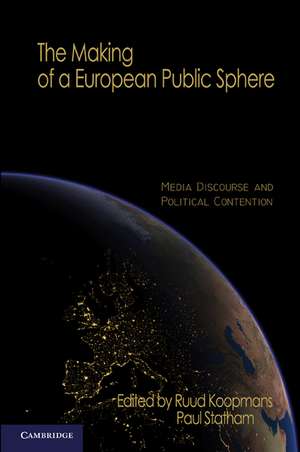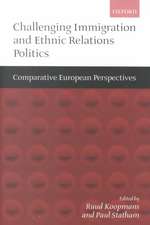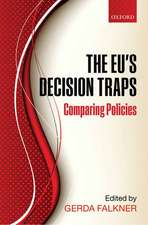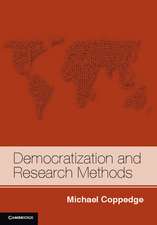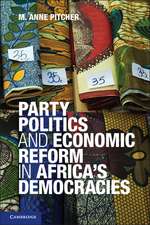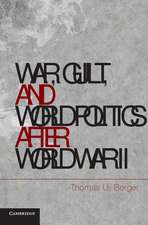The Making of a European Public Sphere: Media Discourse and Political Contention: Communication, Society and Politics
Editat de Ruud Koopmans, Paul Stathamen Limba Engleză Paperback – 28 iul 2010
| Toate formatele și edițiile | Preț | Express |
|---|---|---|
| Paperback (1) | 265.70 lei 6-8 săpt. | |
| Cambridge University Press – 28 iul 2010 | 265.70 lei 6-8 săpt. | |
| Hardback (1) | 469.64 lei 6-8 săpt. | |
| Cambridge University Press – 12 sep 2010 | 469.64 lei 6-8 săpt. |
Din seria Communication, Society and Politics
-
 Preț: 188.94 lei
Preț: 188.94 lei -
 Preț: 207.35 lei
Preț: 207.35 lei -
 Preț: 177.14 lei
Preț: 177.14 lei -
 Preț: 192.21 lei
Preț: 192.21 lei -
 Preț: 227.23 lei
Preț: 227.23 lei -
 Preț: 388.16 lei
Preț: 388.16 lei -
 Preț: 204.48 lei
Preț: 204.48 lei - 11%
 Preț: 568.81 lei
Preț: 568.81 lei -
 Preț: 173.02 lei
Preț: 173.02 lei -
 Preț: 204.56 lei
Preț: 204.56 lei -
 Preț: 230.51 lei
Preț: 230.51 lei -
 Preț: 209.78 lei
Preț: 209.78 lei -
 Preț: 267.61 lei
Preț: 267.61 lei -
 Preț: 269.58 lei
Preț: 269.58 lei -
 Preț: 269.19 lei
Preț: 269.19 lei -
 Preț: 203.50 lei
Preț: 203.50 lei -
 Preț: 229.74 lei
Preț: 229.74 lei -
 Preț: 206.29 lei
Preț: 206.29 lei -
 Preț: 273.89 lei
Preț: 273.89 lei -
 Preț: 266.47 lei
Preț: 266.47 lei -
 Preț: 326.70 lei
Preț: 326.70 lei -
 Preț: 252.03 lei
Preț: 252.03 lei -
 Preț: 289.01 lei
Preț: 289.01 lei -
 Preț: 267.61 lei
Preț: 267.61 lei -
 Preț: 226.68 lei
Preț: 226.68 lei - 11%
 Preț: 558.08 lei
Preț: 558.08 lei -
 Preț: 288.04 lei
Preț: 288.04 lei -
 Preț: 313.10 lei
Preț: 313.10 lei
Preț: 265.70 lei
Nou
Puncte Express: 399
Preț estimativ în valută:
50.85€ • 52.89$ • 41.98£
50.85€ • 52.89$ • 41.98£
Carte tipărită la comandă
Livrare economică 14-28 aprilie
Preluare comenzi: 021 569.72.76
Specificații
ISBN-13: 9780521138253
ISBN-10: 0521138256
Pagini: 356
Ilustrații: 21 b/w illus. 47 tables
Dimensiuni: 155 x 235 x 20 mm
Greutate: 0.5 kg
Editura: Cambridge University Press
Colecția Cambridge University Press
Seria Communication, Society and Politics
Locul publicării:New York, United States
ISBN-10: 0521138256
Pagini: 356
Ilustrații: 21 b/w illus. 47 tables
Dimensiuni: 155 x 235 x 20 mm
Greutate: 0.5 kg
Editura: Cambridge University Press
Colecția Cambridge University Press
Seria Communication, Society and Politics
Locul publicării:New York, United States
Cuprins
Introduction: Europe's search for a public sphere Paul Statham; Part I. A European Public Sphere: Questions and Approach: 1. The European Union and the public sphere: conceptual issues, political tensions, moral concerns, empirical questions Jos de Beus; 2. Theoretical framework, research design and methods Ruud Koopmans and Paul Statham; Part II. European Public Debates: Visibility and Inclusiveness: 3. The Europeanization of public spheres: comparisons across issues, time and countries Ruud Koopmans, Jessica Erbe and Martin F. Meyer; 4. Winners and losers, supporters and opponents in Europeanized public debates Ruud Koopmans; Part III. Mass Media: Performance, Claim Making and Framing: 5. Making Europe news: journalism and media performance Paul Statham; 6. The media's voice over Europe: issue salience and conflict lines in editorials Barbara Pfetsch, Silke Adam and Barbara Eschner; 7. Transnational political communication on the Internet: search engine results and hyperlink networks Ruud Koopmans and Ann Zimmermann; 8. Framing the European Union in national public spheres Juan Diez Medrano and Emily Gray; Part IV. Political Actors: Collective Action and Party Competition: 9. Going public in the EU: action repertoires of collective political actors Hanspeter Kriesi, Anke Tresch and Margit Jochum; 10. Political party contestation: emerging Euroscepticism or a normalization of Eurocriticism? Paul Statham, Ruud Koopmans, Anke Tresch and Julie Firmstone; Conclusion: 11. What kind of Europeanized public politics? Paul Statham.
Recenzii
“A democratic European Union, engaging citizens not just technocratic elites, requires a vibrant European public sphere to strengthen integration and legitimacy. Koopmans and Statham lead a first-rate team of international scholars to assess how far such an arena had emerged by the 1990s. Comparing newspaper and online coverage of European affairs in seven nations, supplemented with journalist interviews, the study concludes that the EU is publicly visible today on the policy issues where the EU is most influential, such as the euro. Koopmans and Statham present a highly original and theoretically-rich study providing novel insights into processes of political communications and European Union policymaking.”
—Pippa Norris, Harvard University
“This is a book of major importance. It is hard to imagine how any future scholar addressing issues of Europeanization could possibly ignore it.”
—William Gamson, Boston College
“European integration and European democracy are increasingly contested. Elites can no longer take public support for granted. The debates are taking in place in the mass media. This book documents in detail who raises which issues with whom and to whom in the European public sphere. It represents a giant leap forward in the study of the European public sphere by a group of top experts in the field. A must-read if you want to understand why the European Union and its policies are becoming ever more contentious.”
—Thomas Risse, Freie Universität Berlin
“A collectively written work rarely exhibits consistency in its conceptual framework or applies a common methodology. This rigorous argument for the existence of a ‘Europeanized’ public sphere, therefore, is surely an exception. Even better, as the European Union faces its present deep financial and political crisis, the authors’ central thesis will be severely tested, providing grounds for future debate.”
—Philip Schlesinger, Centre for Cultural Policy Research, University of Glasgow
—Pippa Norris, Harvard University
“This is a book of major importance. It is hard to imagine how any future scholar addressing issues of Europeanization could possibly ignore it.”
—William Gamson, Boston College
“European integration and European democracy are increasingly contested. Elites can no longer take public support for granted. The debates are taking in place in the mass media. This book documents in detail who raises which issues with whom and to whom in the European public sphere. It represents a giant leap forward in the study of the European public sphere by a group of top experts in the field. A must-read if you want to understand why the European Union and its policies are becoming ever more contentious.”
—Thomas Risse, Freie Universität Berlin
“A collectively written work rarely exhibits consistency in its conceptual framework or applies a common methodology. This rigorous argument for the existence of a ‘Europeanized’ public sphere, therefore, is surely an exception. Even better, as the European Union faces its present deep financial and political crisis, the authors’ central thesis will be severely tested, providing grounds for future debate.”
—Philip Schlesinger, Centre for Cultural Policy Research, University of Glasgow
Descriere
This book shows how European integration is debated in the mass media, and how this affects democratic inclusiveness.
